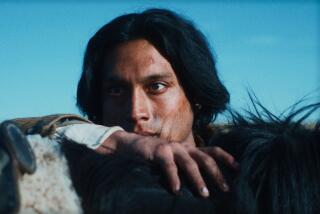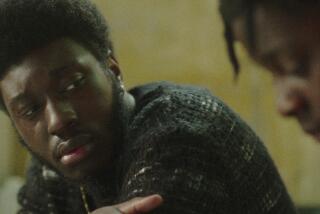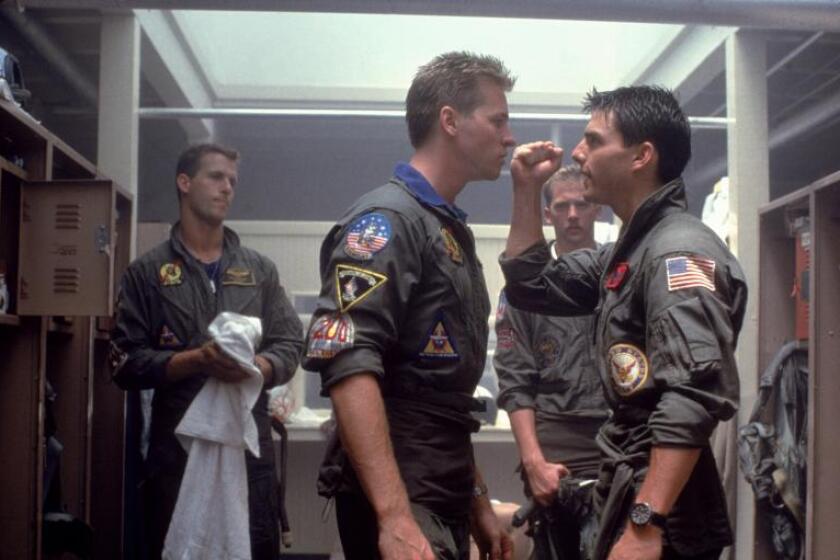MOVIE REVIEW : Moving Portrait of a Kenyan ‘Kitchen Toto’
- Share via
With detachment and compassion, writer-director Harry Hook records in “The Kitchen Toto” (the AMC Century 14 and the Beverly Center Cineplex) those first fissures in a colonial society that foreshadow its inevitable disintegration. It is a film in which a serene, seemingly timeless way of life is jolted by acts of savage violence. By the time the film has reached its conclusion, Hook has managed to bring Kenya’s fight for independence to bear upon one small, bright black boy named Mwangi (Edwin Mahinda).
When Mwangi’s Christian preacher-father (Nathan Dambuza Mdledle) speaks out against the violence of the burgeoning Mau Mau Uprising--the year is 1950--it costs him his life at the hands of his own people, leaving his wife (Ann Wanjugo) with five children to raise. Drawing upon a lifetime of experience in dealing with white masters, she cajoles and wheedles the local police chief, John Graham (Bob Peck), to hire Mwangi as a kitchen toto , or helper.
For Mwangi it is an introduction into an entire new world, one filled with undreamed-of comforts but one in which he is at all times a subordinate and is often made to feel inferior as a matter of course. At play, he and Graham’s 11-year-old son, Edward (Ronald Pirie), are very nearly equals. But Edward, who’s a budding great white hunter, expects Mwangi to polish his boots on demand.
If Graham represents the white colonial at his most decent, sane and fair-minded, his wife (Phyllis Logan) is another matter. She is a humorless, self-important woman who takes the dealing with servants strictly as an article of faith. (You wonder whether Logan’s and Peck’s passing resemblances to Queen Elizabeth II and Prince Philip are intended to reinforce the couple as symbols of empire.) She is flustered (and therefore threatened) to discover that Mwangi can read and write English, whereas her other servants use their thumbprints as their signatures. (This incident is typical of the film’s telling details.)
Nevertheless, life at Graham’s large, rambling home on the edge of a forest proceeds as calmly, even idyllically, as life at Scarlett O’Hara’s Tara did before the Civil War. (Ironically, the Graham’s elderly houseboy has a fondness for Stephen Foster’s “Long, Long Ago.”)
There is an orderliness about this existence in which everyone, black and white, knows his or her place, and this creates an illusion of stability. But it is only an illusion, one that explodes in such a way as to place Mwangi in a terrifying conflict of loyalties--to the master who has been good to him and to his own people who are determined to win their freedom at whatever cost. (The price was to be high: By 1952, 14,000 blacks had lost their lives in a fight for freedom in which only 63 Europeans had died.)
At once contemplative and anguished, “The Kitchen Toto” is a superb film and represents an astonishingly assured debut for the Kenya-born Hook, a graduate of London’s National Film School.
In its understated yet deeply passionate way, the film is a remarkably comprehensive, skillfully drawn portrait of the colonialism that was to become nearly everywhere an eventual casualty of World War II. In its identification with nature and in the depth and breadth of its perception and concerns the film brings to mind Renoir’s “Rules of the Game” and “The River.” Beautifully wrought, “The Kitchen Toto” (MPAA-rated PG-13 for violence) is in every way exceptional.
‘THE KITCHEN TOTO’
A Cannon Group presentation of a Skreba Film in association with British Screen and Film Four International. Executive producers Menahem Golan, Yoram Globus. Producer Ann Skinner. Writer-director Harry Hook. Camera Roger Deakins. Music John Keane. Production designer Jamie Leonard. Costumes Barbara Kidd. Second-unit camera Charles Patey. Supervising film editor Tom Priestley. With Edwin Mahinda, Bob Peck, Phyllis Logan, Robert Urquhart, Kirsten Hughes, Edward Judd, Nathan Dambuza Mdledle, Ann Wanjugo, Job Seda, Leo Wringer, Nicholas Charles, Ronald Pirie.
Running time: 1 hour, 35 minutes.
MPAA-rated: PG-13 (parents strongly cautioned; some material may be inappropriate for children younger than 13).
More to Read
Only good movies
Get the Indie Focus newsletter, Mark Olsen's weekly guide to the world of cinema.
You may occasionally receive promotional content from the Los Angeles Times.










